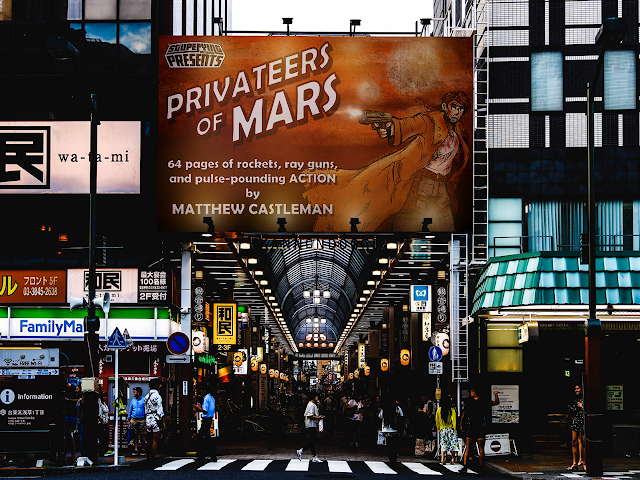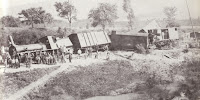
Editor’s Note: In
1721, in an alternate timeline, the crowned heads of all the great powers of Europe, appalled by the constant carnage and
expense of the Thirty Years’ War, the Nine Years’ War, the War of
Spanish Succession, the Great Northern War, the War of the Quadruple
Alliance, the Russo-Persian War, and all the other wars large and small
that filled the years of the 17th and
early 18th centuries, finally decided it was time to do
something about it. In that year their envoys met in Brandenburg, then
in the Kingdom of Prussia, to hammer out a treaty that would avoid all the
failings, pitfalls, and loopholes of all previously broken peace
treaties. After months of strenuous negotiations they emerged with the Brandenburg Accords,
an agreement breathtaking in its brilliance. No longer would the powers
of Europe resolve their disputes and ambitions with cannon, sword, and
gun. Now, they would compete by
demonstrating their cultural superiority.
For nearly 200 years, the Brandenburg Accords kept the peace—until the early 20th Century…
___________________
“The Cool War”
by Anatoly Belilovsky
In case y’all were wondering how the Berlin Wall came down—buy me a drink and I’ll tell you.
Thank you most kindly, sir. It’s good that common courtesy isn’t neglected in these dark ages of the 2020’s, the way education is—
Speaking of which, what do you know about the Cool War? That we won it? That’s it? That’s the whole thing?
Sigh. Young people today…
See, there was once a time when the Cool War looked like there was more than one side in it. Russians have always been pretty good at musical warfare. They came late to it; they weren’t among the original signers of the Brandenburg Accords, old Tsar Peter being of the gunpowder-and-bayonet persuasion, but they joined under Catherine, right after she imported half the composers in Italy to her court in Saint Petersburg. Napoleon almost made Russia regret the choice, having brought the big guns of Beethoven and Rossini, but they used brass wind instruments quite a bit. Ever tried playing “Eroica” outdoors in the winter in Moscow? Poor bastards lost half their orchestra to frostbite. And of course Russians never let anyone forget the time they stopped the Prussians under Wagner with Mussorgsky’s “Night on Bald Mountain,” while conveniently forgetting the debacle when the whole Russian army ran from a single Austro-Hungarian klezmer quartet before they could deploy for a performance of the “1812 Overture.”
Of course, that was the twentieth century, when it actually mattered whether the people wanted tubas or butter. At least it did among member states of NATO, the North Atlantic Touring Orchestra, and the vox populi had piped up pretty loudly in favor of the dairy industry. The other side was… kinda the way we are now. Soviets started their build-up just as we started the big drawdown, so as our big bands went into early retirement one after another, the Russkis put together division-strength Red Army Chorus units with mechanized support. We had invested in cutting-edge technology, solid state hi-fi battlefield amplifiers with all-weather loudspeakers, and for a while we had them on the run. But then Elvis’s enlistment ended, he took “Hound Dog” back Stateside with him, and with that went our hopes for a quick victory. So we settled down to a long, drawn-out, low-intensity war of attrition. We had the advantage of being the more popular side for high-value defectors: Stravinsky, for example—the Russians never did find a good countermeasure to “The Rite of Spring,” so they built the Berlin Wall to screen out all the high-pitch dissonances that made it work. They had Paul Robeson for a while, but he was a loose cannon. Every once in a while he sang a song in Yiddish and watched the common soldiers dance and the senior officers jump out their windows, so they shut him down. Then he learned enough Russian to figure out some of what they said behind his back, and went back to where people at least had the decency to say the same to his face. The Russian subs would play “Kalinka” at our ships, we’d pipe “Rock Around The Clock” through the SOSUS line, they’d come back at us with one of their revolutionary songs, like:
I’m so proud of my Mo-ther-land,
Workers, peasants walking hand-in-hand,
From Carpathian Mountains to Bering Sea
There is no more greedy bourgeoisie…
We’d respond with “America the Beautiful.”
And so on, ad nauseam.
It was into this stalemate that I was commissioned in 1989, a fuzzy-cheeked second lieutenant of violins fresh out of Juilliard, and deployed in my first overseas posting in Berlin at Checkpoint Charlie. I was equally terrified of making a fool of myself in front of my troupe and in front of Bass CO Hollis, and only a little of the enemy. That was dumb, now that I look back on it. The Soviet T-55 Main Battle Trumpet was a scary thing, diesel powered, with a 120 mm smoothbore reed and shaped-charge percussion caps; and those Mi-24 Hindemith helicopters could sneak up on you and start playing “The Dance of The Sugar Plum Fairy” as you sat in the latrine—I get shudders even now, just thinking about it.
But this was Berlin, the war was still cool and occasionally so was the beer, and on our days off we could walk past the checkpoint, flash our military IDs, and stroll right into East Berlin. I loved East Berlin, really I did. It was the only place that could make barracks look bright and shiny and welcoming.
One gray and rainy Sunday I stopped at the PX on my way to Checkpoint Charlie, and ran into my buddy Wes. Wes, it transpired, got one of my brother’s letters by mistake, and carried it with him in case he saw me. He slipped it into my pocket, patted my shoulder, and off we went our separate ways. I didn’t open it till I got drunk enough to care, at a gray and dingy GDR bar.
There I was, sipping my fifth beer and reading the letter, when I saw the kellner craning his neck to read over my shoulder. He looked like an old Timpanenfuhrer to me, his back hunched from carrying big drums on forced marches, so I turned to bring the letter closer to him, to make him less likely to need a chiropractor afterwards. I heard him tsk-tsk behind me.
“Life is hard in America, no?” he said in a bad movie accent.
I shrugged. “Like everywhere, I suppose,” I said.
“Much better here,” the kellner said. “We have waltz and you have blues—there must be reason, nicht?”
I nodded. He spoke again, but damned if I remember what he said, because a blues line crawled into my ear and would not let go, and the words of my brother’s letter rearranged themselves into verse:
Went home from work, traffic as far as the eye can see,
I honked my horn, I turned up the AC,
I’m driving so I can’t stop at a bar and drink some booze,
I’ve got the minimum-wage-earning, oppressed-American-worker blues…
The next half-hour was a blur. I remember playing for the kellner and the half-dozen VoPos in the bar on the bar’s rinky-dink piano:
Woke up this morning, flat tire on my car,
Gotta walk to work, half a mile’s too far,
Gonna sweat in the sun, get dust on my shoes,
I’ve got the minimum-wage-earning, oppressed-American-worker blues…
I remember a crowd gathering, several opening ominous-looking cases to retrieve oboes and bassoons, as I sang:
I’m sick of chicken, can’t afford filet mignon
more than once a week, how can I go on?
Drinkin’ bourbon ‘cause I can’t afford chartreuse,
I’ve got the minimum-wage-earning, oppressed-American-worker blues…
I remember marching at the head of a crowd through the streets of Berlin toward the gray, dingy side of the Berlin Wall:
On vacation in Florida, same old sun, same boring palm trees,
Same Atlantic ocean, same Atlantic ocean breeze,
Next year I’ll try and save up for a cruise,
I’ve got the minimum-wage-earning, oppressed-American-worker blues…
And I remember standing in the concrete wreckage, fragmented graffiti iridescent in the sun, taking my bow—
Umm... guys? Where are y’all going? Pennsylvania Avenue? What’s on… Oh.
Hey! You can’t just sing my song like that! It’s copyrighted!
__________________________
Anatoly Belilovsky
was born in a city that has changed owners six or seven times in the
last century, the latest crude attempt at adverse possession being in
progress even as we speak. He was traded to the US for a truckload of
wheat and a defector to be named later, learned English from Star Trek
reruns, and went on to become a SFWA member in spite of a chronic cat
deficiency by publishing nearly 100 pieces of original and translated
prose and poetry, much of it collected in Halogen Nightmares and Other Love Stories. He tweet occasionally at @loldoc. (Come for the puns, stay for the punditry.)Anatoly has been a recurring contributor to Stupefying Stories since his story “Picky” appeared in issue #1. We are delighted to be bringing you “The Cool War”—
And we don’t usually do this, but “The Cool War” is part of a story cycle that can’t seem to find a permanent home. “Kulturkampf,” the story of Wagner’s campaign through France, first appeared in 2011 in the Immersion Book of Steampunk. “The Perils of Bonaparte,” which recounts Napoleon’s disastrous invasion of Russia in 1812, appeared years later in The Copperfield Review. “The Sound of Music,” which tells the story of… No, I won’t give it away, you’ll just have to read it… appeared here in Stupefying Stories a mere two weeks ago: if you haven’t read it, do so now.
Then, after you’ve read “The Sound of Music,” I want you to jump over to Cast of Wonders and listen to the audio adaptation of “Kulturkampf” you’ll find there. Personally, I think it’s both brilliant and hilarious. It’s a fine example of the sort of thing I would like to be doing with fiction on this site.
With you help, we can move toward doing this. Why not donate or subscribe today?





















































